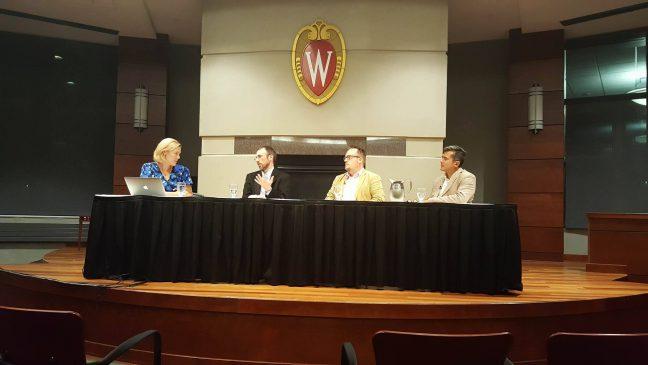Three of University of Wisconsin’s top political and media experts covered the potential implications social media is playing in the current election in an ever-more divided electorate during a panel Tuesday evening.
The panel, inspired by On Wisconsin’s fall issue exploring the social media strategy of presidential candidates, was livestreamed from Grainger Hall and moderated by the university alumni magazine’s co-editor, Jenny Price. The panelists answered both her questions and those submitted via Twitter using the hashtag #OnWisChat.
The three experts included: Barry Burden, a professor of political science and director of the UW’s Elections Research Center; Mike Wagner, an associate professor in the School of Journalism and Mass Communication who’s also affiliated with the Department of Political Science; and Michael Xenos, a professor of communication science and chair of the Department of Communication Arts.
While Clinton holds lead over Trump, poll finds gap cut in half
To kick off the event, the panelists touched on some of the qualities making this year’s election unlike anything seen before.
“So many things [make this election year distinctive], I think it may start and end with Donald Trump,” Burden said.
During the primary campaign, Wagner noted that Trump not only made himself hyper available to media requests before and after debates, but used Twitter to ring up attention in the times when the media wasn’t paying him notice.
Wagner alluded that it was this ability to take up airspace by leveraging both traditional and social media that helped him drown out other contenders.
While polls indicate that the populace is increasingly polarized, Wagner and Xenos said social media users are actually more likely to see and be open to engaging with opposing viewpoints online than they traditionally have been in public spaces.
Xenos also said exposure to opposing viewpoints on social media can actually humanize the opposing viewpoint. Social media users see their relatives, their friends and neighbors express their views online.
Near the conclusion of the panel, one viewer asked whether or not the American public could expect to come back from such a divisive election cycle.
While the two parties seemed to be on the same page for a short while in the aftermath of 9/11, Xenos asserted that if a national terrorist attack couldn’t unify the country, then he wasn’t certain anything could.
While the three panelists were in agreement that the outlook isn’t rosy, Wagner offered a positive spin to the pessimism.
Wagner pointed out that the time when American academics actually started to measure where people fell on the political spectrum also happened to be one of the most politically moderate periods in the history of our country.
Alluding to a history which contains a civil war, Wagner asserted that our country has been divided for much of its existence.
“Even in the face of such strong division the republic sustained itself despite that,” Wanger said.


















